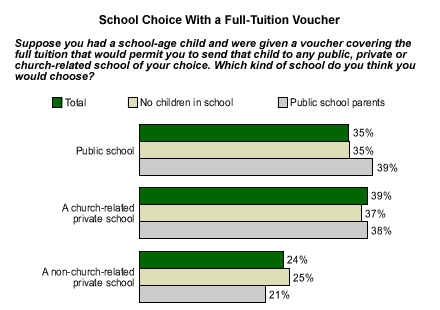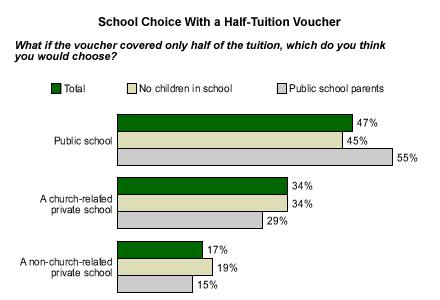This article contains findings from the 35th Annual Phi Delta Kappa/Gallup Poll of the Public's Attitudes Toward the Public Schools, released on Aug. 20 in Washington, DC.
The debate over the relative merits of school vouchers has been ratcheted up recently with scuffles on Capitol Hill over whether to provide them to parents in the District of Columbia. Proponents of vouchers generally feel that the quality of education would be improved because schools would be competing for enrollment and it would provide parents more choice in where their children attend school. Opponents tend to view the idea of using taxpayer dollars to pay for religious or private schools as potentially harmful to the quality of public education. In the summer of 2002, the Supreme Court ruled that a voucher program in Cleveland was constitutional, thus paving the way for more such programs throughout the nation.
The 2003 PDK/Gallup survey* asked U.S. adults for their opinions about vouchers; the results indicate that Americans are somewhat divided on the issue. In fact, findings from several surveys conducted by Gallup and other organizations in 2002 and 2003 show that there is no clear consensus on the issue.
This year's PDK/Gallup survey asked about the Supreme Court decision and whether respondents favor or oppose their state making such vouchers available. According to their responses to this question, a fairly slim majority of Americans (56%) oppose such vouchers and 42% favor them.
Other surveys reflect a similar division of opinion. A Washington Post/Kaiser Family Foundation poll from August 2002 showed 47% of Americans in favor and 49% opposed to "providing parents with tax money in the form of school vouchers to help pay for their children to attend private or religious schools." However, in a January 2001 Gallup Poll, 62% of adults reported that they would favor a proposition giving parents the option of using "government funded school vouchers to pay for tuition at the public, private, or religious school of their choice." When the question was asked just about using the money to attend private school (and did not mention the word "choice"), the public was divided, with 48% in favor and 47% opposed.
Choices
The 2003 PDK/Gallup survey asked Americans hypothetically how they would respond if given the choice of a voucher covering the full tuition to send their child to any public, private, or church-related school. Responses were again divided, with 35% choosing a public school, 39% choosing a church-related private school, and another 24% choosing a non-church-related private school.

However, when asked the same question about vouchers and told that the voucher would cover only half the tuition, the plurality report that they would choose the public school option (47%), although a majority still would opt for either a church-related private (34%) or a non-church private school (17%). Parents of public school children (55%) are somewhat more likely than adults who do not have children in school (45%) to choose the public school option in response to this question -- a difference that did not emerge in responses to the question about the full-tuition voucher.

Bottom Line
Americans are conflicted about voucher programs. Opinion on this complex issue seems to vary widely according to the wording and context of the question being asked. Even when offered the option of a voucher covering the full tuition of the school of their choice, a sizable minority of Americans say they would still send their child to public school, although most would opt for a private school. This issue is likely to become more salient as more and more states consider voucher programs for their schools, in light of the Cleveland decision by the Supreme Court.
*The findings of the survey are based on telephone interviews with a random sample of 1,011 U.S. adults, aged 18 and older, conducted from May 28 to June 18, 2003. For results based on this sample, one can say with 95% confidence that the maximum error attributable to sampling and other random effects is ±3 percentage points.